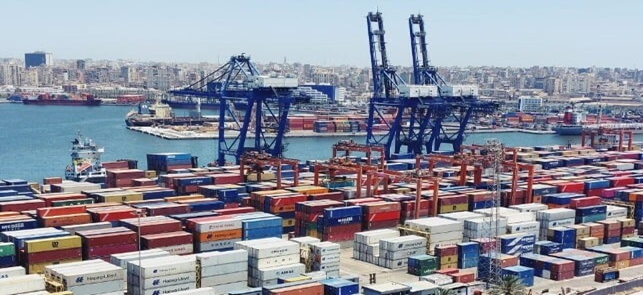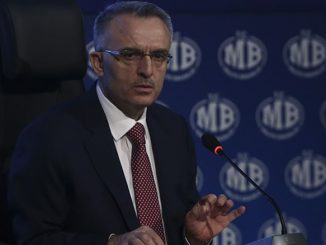
Amid a major hard currency crisis in Egypt the North African country is suffering a massive backlog across the country’s ports, with goods worth $9.5 billion are still stuck there.
The Egyptian ports have recently been clogging up with goods due to a dollar shortage, a crisis which has been worsened by a substantial nosedive of the Egyptian pound.
The local currency has depreciated by about 36 percent since the beginning of the year.
“The ports had goods worth about $15-16 billion until the end of November, and we worked with the Central Bank and the banking sector, and we succeeded in releasing $5 billion worth of goods from the beginning of the month until December 23,” said Mostafa Madbouly, Egypt’s prime minister.
The prime minister also ordered the formulation of a plan to release the remaining goods that are clogging the country’s ports, a crisis worsened by import restrictions put in place by the government to conserve foreign currency. The shortage of hard currency needed to operate Egypt’s import-heavy economy has affected supply lines in almost every sector and resulted in a sharp increase in prices.
As a net importer of fuel and food commodities, Egypt is grappling with the worst economic crisis in years. The Russian invasion of Ukraine has caused far-reaching macroeconomic upheavals, including runaway.
Addressing the foreign currency crisis in Egypt, the Financial Times has published a report, confirming the crisis and highlighting that ‘There are no dollars’ there to fund the country’s imports.
“With foreign currency in short supply in Egypt, Rafik Clovis spent December anxiously waiting to find out whether his bank would be able to provide the $67,000 he needed to fund the import of a consignment of car parts from Europe,” the report stated, adding, “But by the end of the year, the dollars were still not available; as a result, his imports in 2022 were just a tenth of a normal year’s amount.”
“Conditions are catastrophic,” Clovis said. “There are no dollars and I have no idea how it will be resolved. I have five employees, and now we are surviving off what we made in previous years.”
The importer’s predicament is shared by many businesses as Egypt struggles with a foreign currency crunch. The first three weeks of Russia’s full-scale invasion of Ukraine in February led to $20bn of outflows from the Arab world’s most populous country as foreign portfolio investors rushed to safe havens.
Despite $13bn in deposits from the United Arab Emirates, Saudi Arabia and Qatar and another $3.3bn in asset sales to the UAE in 2022, foreign currency has remained in desperately short supply for the import-dependent country.
A week ago Egypt’s Abdel Fattah al-Sisi said banks would secure the foreign currency necessary to clear a backlog of imports within four days, without going into detail. According to Mostafa Madbouly, the prime minister, $9.5bn worth of goods are still held up at the country’s ports.
The Ukraine war’s inflationary impact on prices for basic commodities such as wheat — Egypt is the world’s biggest importer of the grain — has added to pressures on the country’s foreign currency resources, forcing the Central Bank of Egypt to devalue the pound in March and October. Inflation in November reached 18.7 per cent, its highest rate in five years.
For the fourth time in six years, Egypt has had to resort to the IMF, which last month approved a $3bn loan over four years. At the heart of the agreement is a commitment by Cairo to move to a flexible exchange rate regime in which market forces determine the currency’s value — something Egyptian governments have long resisted.
In an effort to conserve foreign currency, the CBE placed restrictions on imports in March. The requirement to use letters of credit slowed the process and created a backlog of unfulfilled demand for dollars. It also prioritised access, placing basic commodities such as staple foods and medicines at the top of the list. The CBE cancelled the requirement to use letters of credit on December 29.
The two devaluations have reduced the pound from around E£16 to the dollar to E£24.7. The black market rate is even lower.
The CBE increased interest rates by 300 basis points on December 22, taking the overnight deposit rate to 16.25 per cent. The rise surpassed analysts’ expectations and reflected increasing concern about inflation and the falling pound, according to London-based consultancy Capital Economics.
Businesses from poultry farms to car manufacturers have been badly hit in a country that imports most of its food and many of the inputs for its industries. As policymakers ponder when and how to move to a flexible exchange rate regime where the value of the pound is not propped up by the CBE, entrepreneurs complain they have no visibility on the future.
“We are working day by day,” said the head of a poultry-based business who complained that shipments of grain, mainly soya and corn, used for feed, were stuck at ports because of the dollar shortage. “Every day we have to find feed, and we sometimes run out and the birds are not fed.”
He said the agribusiness had had to “depopulate” some flocks by selling birds at a loss before the age at which they were usually sent to market. “The price is way below cost and we know some of our competitors have had to kill chicks,” the executive said. The “substantially” lower supply of chickens being sold for meat had increased prices by more than 50 per cent, he added.Mohamed Abu Basha, head of macroeconomic analysis at Cairo-based investment bank EFG-Hermes, said the shift to a flexible exchange rate could not “happen overnight” and that the authorities needed to “ideally first build up a buffer of foreign currency to help clear the backlog of demand” before moving on the exchange rate.
Farouk Soussa, economist at Goldman Sachs, outlined the difficult options facing Cairo as it sought to build up liquidity to deal with near-term demand for dollars.
“The CBE could clear the market by continuing to raise rates, floating the currency and restricting the money supply, but the implications for prices and growth are problematic,” he said. “The authorities’ preferred option is to wait for inflows from the Qataris, the Emiratis and the Saudis to buy assets in Egypt, but that is also uncertain.”
As policymakers weigh up the options, the outlook for many businesses is uncertain. A senior manager in a multinational auto components company said his business had fared better than most because it was also an exporter, giving it access to foreign currency. But those reserves were being depleted and the company was unsure whether to accept new orders.
“I am not certain that I’ll be able to clear imported inputs for a new order and have to pay thousands in [holding fees] as I wait for dollars,” he said. “If my supplier abroad agrees to defer payment and I can get the goods out of the port, maybe the dollar will have gone up by the time I have to pay.”
He added: “It is also possible the automobile manufacturer I am supplying here will have problems because [supply] of a different part has fallen through, so there is no final product and we all fail.”



